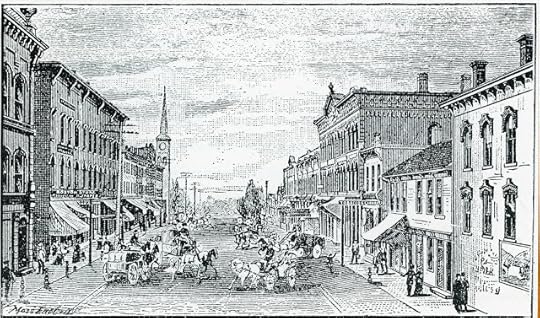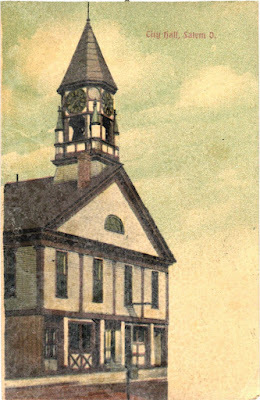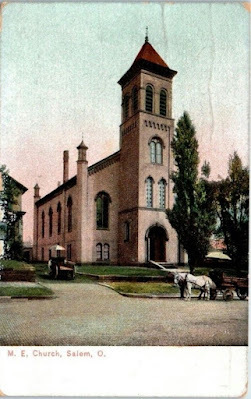A Scene of Public Grief: Bringing the Boys Home After Stones River
A few weeksafter the Battle of Stones River, a trio of gentlemen from Salem, Ohio traveledto the battlefield to retrieve the bodies of some of their townsmen who diedduring the battle. In an extraordinary account from the editor of the SalemRepublican, he described the sad scene that marked the arrival of thebodies at the town hall.
“The rough boxescontaining the dead were placed side by side on the platform of the hall andwere opened as speedily as possible,” he stated. “The first box openedcontained the body of Captain Bean; the next was Hale’s, and so on until allwere opened. Among the few men present was an aged father whose son lay in arude coffin before him. How eagerly he gazed at his boy and said, “That’s myson!” and left the room.”
“Few of us present on this occasion ever saw such a sight aswas here presented. There lay the bodies of four young men in the pride andglory of manhood, three of whom has been buried on the battlefield just as theyfell and presented a ghastly appearance which we do not feel like describing.Captain Bean had been buried in a coffin and did not look so bad,” he wrote.
The article goes on to describe thenature of the wounds suffered by each man and explained how the community bothhonored and grieved for its dead heroes the next day. Special thanks to friendof the blog Ken Bandy who shared this remarkable source from his personalcollection of 65th Ohio accounts.
 Broadway in downtown Salem, Ohio
Broadway in downtown Salem, OhioMessrs. Hudson, West, and Wilson, who left this place onMonday after the Battle of Murfreesboro for the purpose of procuring the bodiesof Captain Urwin Bean [Co. E, 19th Ohio], Thomas T. Hale [ Co. B, 65thOhio], Robert D. Wilson [Co. D, 19th Ohio], Joseph Bull [Co. B, 65thOhio] , Abner J. Crampton [Co. B, 65th Ohio], and Benton Speakman [Co.B, 65th Ohio] returned on Tuesday evening of last week at 10 o’clockwith the above bodies except Crampton’s which they were unable to procure.
Mr. West arrived at home on the Sunday morning previous,leaving the bodies in charge of Hudson and Wilson. Mr. West left the party atElizabethtown, Kentucky, some 40 miles south of Louisville, the snow being sodeep, some three feet, that the train was unable to proceed further. Mr.Hudson, seeing no chance of getting to Louisville by rail, hired a wagon andeight horses to take the bodies by the Lebanon Pike to Louisville, 46 milesthrough the snow. At Louisville, they came by boat to Cincinnati where theywere again placed on board the cars and safely arrived as we stated above.
Although the night was a dismal one, quite a large number ofour citizens were at the station to receive the bodies and have them conveyedto the town hall where they were to be dressed before delivering them to theirfriends. We could not, at this time, but notice the marked difference in themission of those here congregated on this cold, stormy winter’s evening withthose who had assembled over a year ago to bid the same young men, whoselifeless and lacerated bodies lay before them, the last farewell and a heavyGodspeed in the service of their bleeding country.
But tonight, how changed! The earth is robed in a whitemantle and the cold winds of mid-winter are hurling the rain and snow on everyhand, a fit emblem of the occasion. Back then, the beautiful autumn hadshowered her richest treasures upon us and our hearts were light. A sad change hascome over that scene and we are walking amid the wreck of a bloody battle asthe rude boxes before us attest. We hear not the cannon’s roar, nor the quick,sharp crack of the rifle, but here are the remains of a few of the brave menwho participated in that death struggle and have given their lives for thecountry they loved.
 Salem City Hall
Salem City HallLocal History Collection,
Salem Public Library
The bodies were conveyed to the hall with the exception ofWilson’s which was taken to New Albany where his mother resides. The roughboxes containing the dead were placed side by side on the platform of the halland were opened as speedily as possible. The first box opened contained thebody of Captain Bean; the next was Hale’s, and so on until all were opened.Among the few men present was an aged father whose son lay in a rude coffinbefore him. How eagerly he gazed at his boy and said, “That’s my son!” and leftthe room. Who can tell the agony of a fond parent for their child under suchcircumstances?
Few of us present on this occasion ever saw such a sight aswas here presented. There lay the bodies of four young men in the pride andglory of manhood, three of whom has been buried on the battlefield just as theyfell and presented a ghastly appearance which we do not feel like describing.Captain Bean had been buried in a coffin and did not look so bad.
As to the nature of the wounds, Captain Bean was shot in thebreast, the ball passing through his right lung, causing almost instant deathby suffocation. The hair on the left side of his head was clotted with bloodbut no signs of a ball mark could be found. The ball entered the right hip ofSergeant Hale, passed through him, and came out on the left side just below thehip bone. He was carried to the camp hospital nearby and did not die until thenext morning.
Joseph Bull was killed by a piece of shell which explodednear to where he was standing and struck his right side, just below the ribs,and passed through him making a frightful wound. A piece of the same shellwounded Lieutenant R.S. Rook who was standing near him at the time. BentonSpeakman was shot; the ball entered just in front of his left shoulder andpassed through his chest and bowels, coming out near the hip bone on the rightside. He must have been leaning over, or stooping down, at the time. He waskilled instantly.
The bodies, after being washed and dressed, were placed intheir coffins and on Wednesday morning they were delivered to their friends. CaptainBean’s remains were encased in an iron burial case and remained in the hallduring the forenoon and were visited by a large number of citizens. His body,in charge of his brother, was taken to Norristown, Pennsylvania for burialwhere his mother resides. Speakman was taken to the residence of Mrs. Maria Woodleynear Lynchburg in this county where he lived before he enlisted.
 Methodist Episcopal Church
Methodist Episcopal ChurchSalem, Ohio
Local History Collection
Salem Public Library
The funeral services of Hale and Bull took place at theMethodist Episcopal Church on Broadway at 10 o’clock on Thursday the 22ndinstant. The hour appointed for the meeting at the church was announced by theringing of the town bell which was afterwards tolled during the services at thechurch. The principal stores and places of business were closed. The largeaudience chamber of the church was filled at an early hour by our citizens whoevidenced by their presence that this sad occasion was not a private but apublic grief.
The exercises commenced by singing an appropriate hymnfollowed by prayer by Reverend Stevens, and a sermon preached by Reverend C.H.Jackson from the 3rd chapter of 1st Corinthians, 22ndand 23rd verses, which read as follows, “Whether Paul or Apollos orCephas or the world, or life, or death, or things present, or things to come,are all yours. And you are Christ’s and Christ is God’s.”
We should like to have given a portion at least of the remarksmade on this occasion but we are unable to do so. Suffice it to say that thesermon was one worthy in every respect of the time and place. At the close ofRev. Jackson’s remarks, Rev. Stevens narrated the following incidents relatingto the death of these young men as told him by Mr. Hudson who learned the factsfrom their officers and companions in battle. After the recital of theseincidents, a song was sung by the choir befitting the occasion. Thecongregation then formed in procession and took at last view of the departedheroes. They were both buried in the cemetery.
Source:
“From theBattlefield,” Salem Republican (Ohio), January 28, 1863, pg. 2
Daniel A. Masters's Blog
- Daniel A. Masters's profile
- 1 follower



